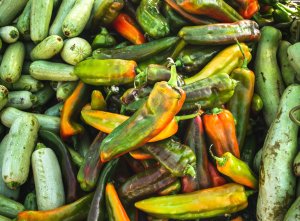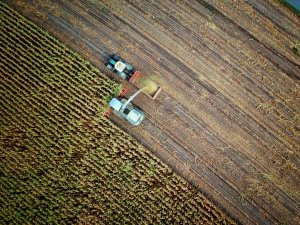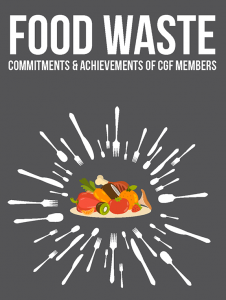In a world with a growing population, increasing cost of food, concerns about inequality and food insecurity, diverting food waste from landfills and finding innovative ways of putting it to beneficial use are particularly important. The UN Food and Agriculture Organization (FAO) reports that 821 million people in the world still suffer from hunger, and yet, a third of all food produced worldwide is lost or wasted.[1] In honour of the World Food Day, celebrated annually on October 16th, and its #ZeroHunger message, The Consumer Goods Forum (CGF) is proud to present some of its members’ inspiring examples of how the private sector is tackling food waste, while feeding those in need.
By addressing our 2015 resolution to halve food waste within the individual operations of our retailer and manufacturer members by 2025, consumer goods companies have implemented various actions to eliminate food waste. In addition to comprehensive measurement of food loss and waste using the Food Loss and Waste Protocol developed in 2016, strict internal procedures and supply chain analysis, product innovation and waste recycling, as well as consumer education, companies have focused significant effort on engaging in local partnerships and serving edible surplus food to underprivileged communities. CGF members, including Campbell Soup Company, Carrefour, Danone, ICA, Jerónimo Martins, METRO, S Group, Walmart, Woolworths and many others, have partnered with local Food Bank associations to donate food to charity organisations and create meals for people in need.

Some European initiatives include Ahold Delhaize’s innovative programme – Meat the Need, which redirects unsold meat to vulnerable families, and Musgrave’s partnership with FoodCloud organisation, which creates 350,000 meals in Ireland annually, while preventing 1,600 tonnes of food going into landfill and saving 6,300 tonnes of CO2 emissions. The UK-based Marks and Spencer launched a nationwide charitable redistribution scheme with its partner Neighbourly, an online platform that connects local charities with businesses. Managing its nationwide scheme through a single platform removes some of the logistical barriers to redistribution, including ensuring that all those registered have the correct charity and food hygiene credentials in place. It also provides live updates on the number of tonnes of surplus food redistributed. Marks and Spencer stores are currently connected to over 600 charities and have donated over 371 tonnes of food providing over 500,000 meals.
As a co-founder of FareShare in 1994, Sainsbury’s continues to redistribute the surplus food from its supply chain for over two decades and counts over 1,080 charity partnerships with its stores. Tesco has likewise launched a programme in partnership with FareShare and FoodCloud in 2016, linking its stores with local charities and community groups such as The Bethel Christian Centre in Dagenham, which serves over a hundred hot meals a week to people in need using the surplus food. The FareShare and FoodCloud technology is accessible, smartphone compatible and allows groups to know how much surplus food they can expect to have for donation at the end of the day, thus having a great potential to be used by the whole industry and to change the face of food redistribution.
In North America, in addition to Target’s food donation efforts to Feeding America, its Waste Minimization team provided a donation application pilot on marking donatable items and trained its stores’ team members on actions to take during disaster events. When Louisiana experienced massive floods in 2016, Target employees took immediate action and donated more than $100,000 worth of food to food banks across South Louisiana.

During its manufacturing operations in India, Unilever managed to collaborate with one of its suppliers – an Indian businesswoman Manisha Dhatrak to set up a processing plant to stop local crops from being wasted. After noticing local farmers in Nasik, India, throwing away crops by the side of the road, Manisha decided to set up a plant to process the local crops. By approaching Unilever, together they help to train smallholder farmers in sustainable agriculture practices. The programme now works with 3,000 farmers, giving them access to ongoing contracts and better-quality materials, improving their livelihoods and expanding opportunities for women.
A leading retailer in South America, Grupo Éxito helps to support 13.2% of Colombian children suffering from chronic malnutrition through its co-financed REAGRO programme, which by working with farmers in 29 municipalities managed to recover more than 3,100 tons of food from agricultural surpluses and benefited more than 43,100 families in 2016. A Hong Kong-based retailer PARKnSHOP by A. S. Watson Group has also formed a partnership with a local NGO Food Angel in July 2012 to launch the Food Rescue for the Needy programme, serving the surplus food to its underprivileged communities. Across the globe, South Africa’s Pick n Pay counts as the largest retail partner of the local Food Forward organisation and focuses on diverging its food waste by creating more than 20,000 meals every day for its recipients.
Food waste is one of the most vital social, economic, and environmental issues facing our planet. At a time in history where nearly one billion people are still dying of hunger or have to settle for inadequate nutrition every year, it is unacceptable that over a third of the world’s food remains abandoned in fields or ends up in landfills.
For more info
Of course, the CGF’s work on eradicating hunger globally doesn’t just end with our work on Environmental Sustainability. Our Health & Wellness team are working to help make food more accessible and affordable. We are creating a collective business movement to empower people to live healthier lives and drive shared business value; supporting SDG 2 (#ZeroHunger) is a critical piece of this collaborative journey. Our food safety work via the Global Food Safety Initiative (GFSI) is also playing its part through its efforts to ensure safe food for consumers everywhere, while our work along the supply chain via our End-to-End Value Chain is looking to increase efficiency and reduce waste from farm to fork.
[1] 2018 State of Food Security and Nutrition in the World report by FAO
This post was written and contributed by:
Aliya Kumekbayeva
Environmental Sustainability
The Consumer Goods Forum

